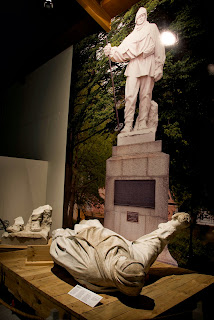The Start of the Antarctic Science Season
On 11 February 1913 England woke to the Daily Mail headline ‘Death of Captain Scott. Lost with four comrades. The Pole reached. Disaster on the return.’ Just a day before, the press had reported that the British Antarctic expedition leader was back in New Zealand after succeeding in his goal to reach the South Geographic Pole; the Royal Geographical Society had even prepared a telegram congratulating him on his success. The palpable sense of anticipation and excitement now turned to despondence.
 |
| The Scott statue in Christchurch awaiting restoration |
I’m currently in Christchurch, visiting friends and colleagues to raise the profile of the Australasian Antarctic Expedition 2013-2014 in New Zealand. On Friday night I gave my first talk on the AAE in New Zealand. The expedition was very well received but it is heartbreaking to see the city still recovering from the tragic events of two years ago. And yet the confidence here is contagious. City venues are being rebuilt and reopened, with an increasing number of public attending open events. On Saturday night, I joined some hundred people to catch a cable car up to the Gondola to mark the start of the Antarctic Science Season; just six months ago this same venue was closed. Hosted by Christchurch City Council and Antarctica New Zealand, the room was packed with New Zealanders and Americans preparing for this summer on the ice. It was fantastic to learn how much research is being planned this year – including the South Koreans opening their second Antarctic base. A century ago, half of Christchurch’s population climbed the same hills to reach the historic port Lyttleton to farewell Scott off on his pioneering journey south. It’s incredible to see how much has changed since then. I’m sure the great British leader would have been impressed.
By Chris Turney (at +Intrepid Science)
By Chris Turney (at +Intrepid Science)


Comments
Post a Comment